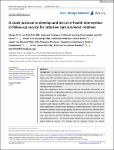A study protocol to develop and test an e‐health intervention in follow‐up service for intensive care survivors' relatives
| dc.contributor.author | van Mol, MMC | |
| dc.contributor.author | Kompanje, EJO | |
| dc.contributor.author | van Bommel, J | |
| dc.contributor.author | Latour, Jos M | |
| dc.contributor.author | Berger, E | |
| dc.contributor.author | Boeter, T | |
| dc.contributor.author | van der Veer, M | |
| dc.contributor.author | Gommers, DAMPJ | |
| dc.contributor.author | van Dijk, M | |
| dc.contributor.author | Ista, E | |
| dc.contributor.author | van der Staa, A | |
| dc.contributor.author | ter Mate, A | |
| dc.contributor.author | Vloet, L | |
| dc.contributor.author | Bolman, D | |
| dc.contributor.author | Groot, M | |
| dc.date.accessioned | 2023-05-22T12:32:03Z | |
| dc.date.available | 2023-05-22T12:32:03Z | |
| dc.date.issued | 2023-05-09 | |
| dc.identifier.issn | 1362-1017 | |
| dc.identifier.issn | 1478-5153 | |
| dc.identifier.uri | https://pearl.plymouth.ac.uk/handle/10026.1/20907 | |
| dc.description.abstract |
Background: The negative impact on long-term health-related outcomes among relatives of critically ill patients in the intensive care unit (ICU) has been well described. High-quality ICU specialized follow-up care, which is easily accessible with digital innovation and which is designed by and with relevant stakeholders (i.e., ICU patients' relatives and nurses), should be considered to reduce these impairments in the psychological and social domains. Aim: The programme's aim is to develop and test an e-health intervention in a follow-up service to support ICU patients' relatives. Here, the protocol for the overall study programme will be described. Study Design: The overall study comprises a mixed-methods, multicentre research design with qualitative and quantitative study parts. The study population is ICU patients' adult relatives and ICU nurses. The main outcomes are the experiences of these stakeholders with the newly developed e-health intervention. There will be no predefined selection based on age, gender, and level of education to maximize diversity throughout the study programme. After the participants provide informed consent, data will be gathered through focus groups (n = 5) among relatives and individual interviews (n = 20) among nurses exploring the needs and priorities of a digital follow-up service. The findings will be explored further for priority considerations among members of the patient/relative organization (aiming n = 150), which will serve as a basis for digital prototypes of the e-health intervention. Assessment of the intervention will be followed during an iterative process with investigator-developed questionnaires. Finally, symptoms of anxiety and depression will be measured with the 14-item Dutch version of the ‘Hospital Anxiety and Depression Scale’, and symptoms of posttraumatic stress will be measured with the 21-item Dutch version of the ‘Impact of Events Scale-Revised’ to indicate the effectiveness of digital support among ICU patients' relatives. Relevance to Clinical Practice: The e-health intervention to be developed during this research programme can possibly bridge the gap in integrated ICU follow-up care by providing relevant information, self-monitoring and stimulating self-care among ICU patients' relatives. | |
| dc.language | en | |
| dc.publisher | Wiley | |
| dc.subject | e-health | |
| dc.subject | follow-up service | |
| dc.subject | intensive care unit | |
| dc.subject | nurses | |
| dc.subject | post-intensive care syndrome | |
| dc.subject | family | |
| dc.title | A study protocol to develop and test an e‐health intervention in follow‐up service for intensive care survivors' relatives | |
| dc.type | journal-article | |
| dc.type | Journal Article | |
| plymouth.author-url | https://www.webofscience.com/api/gateway?GWVersion=2&SrcApp=PARTNER_APP&SrcAuth=LinksAMR&KeyUT=WOS:000985649900001&DestLinkType=FullRecord&DestApp=ALL_WOS&UsrCustomerID=11bb513d99f797142bcfeffcc58ea008 | |
| plymouth.publication-status | Published online | |
| plymouth.journal | Nursing in Critical Care | |
| dc.identifier.doi | 10.1111/nicc.12926 | |
| plymouth.organisational-group | |Plymouth | |
| plymouth.organisational-group | |Plymouth|Research Groups | |
| plymouth.organisational-group | |Plymouth|Faculty of Health | |
| plymouth.organisational-group | |Plymouth|Faculty of Health|School of Nursing and Midwifery | |
| plymouth.organisational-group | |Plymouth|Research Groups|Institute of Health and Community | |
| plymouth.organisational-group | |Plymouth|REF 2021 Researchers by UoA | |
| plymouth.organisational-group | |Plymouth|Users by role | |
| plymouth.organisational-group | |Plymouth|Users by role|Academics | |
| plymouth.organisational-group | |Plymouth|REF 2021 Researchers by UoA|UoA03 Allied Health Professions, Dentistry, Nursing and Pharmacy | |
| plymouth.organisational-group | |Plymouth|Research Groups|Plymouth Institute of Health and Care Research (PIHR) | |
| dcterms.dateAccepted | 2023-04-19 | |
| dc.date.updated | 2023-05-22T12:31:47Z | |
| dc.rights.embargodate | 2023-5-23 | |
| dc.identifier.eissn | 1478-5153 | |
| dc.rights.embargoperiod | forever | |
| rioxxterms.versionofrecord | 10.1111/nicc.12926 |


